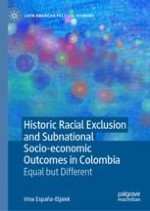2024 | OriginalPaper | Buchkapitel
5. Final Discussions
verfasst von : Irina España-Eljaiek
Erschienen in: Historic Racial Exclusion and Subnational Socio-economic Outcomes in Colombia
Verlag: Springer Nature Switzerland
Aktivieren Sie unsere intelligente Suche, um passende Fachinhalte oder Patente zu finden.
Wählen Sie Textabschnitte aus um mit Künstlicher Intelligenz passenden Patente zu finden. powered by
Markieren Sie Textabschnitte, um KI-gestützt weitere passende Inhalte zu finden. powered by
